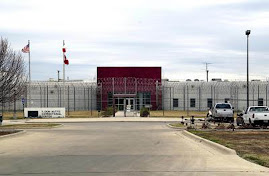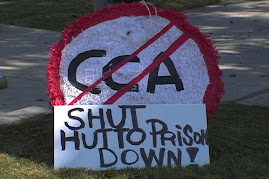The bottom line is not just economic, however. Children and families have suffered inexcusable indignities under this new policy, which treats them like convicted criminals instead of asylum-seekers and potential citizens. Despite the fact that myriad human rights and community groups -- such as the American Civil Liberties Union and the Center for Immigration Studies -- have condemned the practice of detaining children in prison-like environments, ICE is seeking to open three new family detention centers, doubling its capacity. As of this writing, ICE still hasn't released the names of the winning contractors and/or locations, but the announcement is expected to be made sometime this year with the new facilities scheduled to open in 2010. ...Thanks to lawsuits against CCA, children can now wear pajamas, play, and attend classes during the day, and pregnant women are receiving some neonatal care, but the spirit of incarceration continues. Immigration officials claim that family detention is necessary in order to prevent immigrants and asylum-seekers from fleeing the country. However, even ICE admits that alternatives -- like its own pilot program in 2004 where specialists were assigned a limited caseload of detainees whom they monitored using home visits and telephone calls -- have a 94 percent appearance rate overall.
Family detention centers may provide a meager 6 percent reduction in flight risk, but this country pays a far bigger price in lost integrity. We lock up children and their families -- many of whom have suffered economic deprivation, exploitation, and oftentimes, domestic and sexual abuse -- before they've even had a hearing as to their immigration status.
Renee Feltz, a multimedia investigative journalist based in New York City who co-runs a project on the business of immigrant detention, reports that waiting in such unbearable conditions often brings immigrants -- especially women with children -- to their knees. "Many of the people we talked to are so miserable in these facilities that they will eventually agree to being deported even if they think they have a legitimate claim to asylum," Feltz says. "They just want to get out as fast as possible."
In this way, one of the first lessons we teach potential new citizens about America is one of cruel, Orwellian hypocrisy. You must earn your freedom, if at all, via imprisonment. Dignity comes only by bearing undignified conditions. The last administration's obsession with family values is glaringly absent from this Civics 101 course. We welcome children who have heard tall tales of the abundance and liberty of America with rehabbed cells and 10 minutes to wolf down an inadequate lunch of cheap starches on a prison tray.
First and foremost, immigrant family detention must stop. On Jan. 21, Grassroots Leadership, a Southern community organizing group, launched a campaign with this goal, calling it 100 Actions in 100 Days. Given the new administration, hope for immigration reform, and a renewed focus on addressing corporate corruption, it's an opportune time to reactivate the country around this issue.
But there's an even bigger picture here that we must not lose sight of. Immigrant detention, on the whole, is riddled with corruption, inefficiencies, and indignities. Comprehensive immigration reform is a vital component of our country's next few years of healing and reform.
And an even bigger picture still: We live in a society that has bought blindly into the privatization and proliferation of our prisons. It's not so surprising that we force immigrant children to live in cells and wear hospital garb when you consider the national tendency toward incarceration, racism, and xenophobia.
We've got a lot to heal. Let's start by abolishing family detention centers immediately.
Tuesday, February 3, 2009
The American Prospect: The Big Business of Family Detention
Monday, October 13, 2008
Bill to Improve Detention Conditions Introduced to the House
This bill followed the Protect Citizens and Residents from Unlawful Raids and Detention Act (S. 3594) introduced by Senators Menendez (D- NJ) and Ted Kennedy (D- MA). This bill takes aim at the Department of Homeland Security / Immigration and Customs Enforcement raids that have hit the headlines in the past few months.
And earlier this year, Lofgren (D-CA) introduced the Detainee Basic Medical Care Act (H.R. 5950), which responded to the 82 detainee deaths in detention highlighted by the New York Times and Washington Post.
Why are these bills important? ICE has developed Family Residential Standards, which we have covered on this blog, and Adult Detention Standards. These serve as guidance documents for the government and non-governmental contractors that run detention facilities. Yet, the only real oversight remains internal to ICE-- that is, ICE inspects ICE facilities. The issue of internal oversight arose during the Hutto lawsuit, and the government repeatedly argued that there was no need for external inspections. While the Hutto Settlement contained court oversight, those of you familiar with the Hutto Settlement will remember that this will end in August 2009, when the settlement expires.
The bills above are Congress' efforts to give these standards "teeth," and hopefully set the bar a little higher for the treatment of detainees.
Numerous organizations have published statements, press releases, and reports on these bills. A few of them are:
Check back for more information as these bills move through Congress...
Monday, June 23, 2008
Locked and Loaded: CCA, the private jailer and one of Nashville's richest companies, is facing heightened scrutiny after a year of particularly heinou
by Matt Pulle
Located in a bland, almost anonymous Green Hills office park of fake lakes and fountains is the headquarters of the nation's largest private prison company, which, at the moment, may be the most disparaged corporation in the country. Since its inception in 1983, CCA has encountered legions of angry detractors who believe that the business of punishing criminals should not be—well, a business. But if the company has become accustomed to criticism over the years—like a best-selling author whose novels garner predictably bad reviews—it is now mired in a series of scandals, embarrassments and public-relations catastrophes that may tar its reputation for years to come.
In the last 18 months alone, CCA has been the target of several stinging lawsuits supported by detailed affidavits and third-party reports alleging dangerous and inhumane practices that have put inmates' lives at risk. Whistle blowers, once in positions of trust at CCA, have emerged from the shadows to tell vivid tales of corporate misconduct. Federal authorities have castigated the publicly traded corporation for operating an immigration detention facility in Texas on the cheap. And at that CCA complex—which at one point forced children of immigrant detainees to dress in prison garb—dozens of incarcerated women and children have come forward with gut-wrenching tales of anguish and neglect.
...In 2005, Michael Chertoff, secretary of the Department of Homeland Security, which runs the Immigration and Customs Enforcement Division (ICE), ended the practice of "catch-and-release"—which permitted undocumented immigrants like Elsa to remain free at-large while they awaited their day in court. Under catch-and-release, no-shows were common. So after 9/11, the specter of illegal immigrants from all over the world roaming the country became a security issue. Pilot programs sprung up that tracked immigrants with electronic bracelets, though Chertoff went with a draconian plan instead: Throw many of these men, women and children in Hutto, a former medium-security prison that was surrounded by a 15-foot fence topped with rings of barbed wire when it reopened in 2006 as a place for immigrant families.
...Just about every affidavit from a child or mother portrayed Hutto the same way—as a rough and cold place, where kids lie awake at night hungry and crying in the dark. And if they act up, like children often do, a guard would threaten to remove them from their families. To hear the stories from inside the walls, Hutto seems more like a medieval dungeon than a 21st century facility run by a wealthy company.
"The conditions were shocking," says Barbara Hines, a University of Texas law professor who spent many hours inside the facility representing detainees. "There were children in prison garb dressed like their parents; it was like an adult prison system. Seven times a day parents and their children were required to stay in their pods so they could be counted. Laser beams shined through the cells at night."
Just about everyone else who walked through the gates at Hutto, including federal authorities, saw it as a deeply troubling facility. In March 2007, ICE inspectors visited Hutto and, in their own distinct bureaucratic language, corroborated the anguished accounts of the detainees. The inspectors noted that their "overall review of the facility can be accurately rated as deficient" and determined that the staff wasn't following basic standards of detention.
"The Review Team's observation of CCA's overall attitude is of disinterest and complacency in their work performance," the agency noted in its report.
A month later, an interoffice memo from ICE said that at Hutto, CCA is "losing staff as quick as they can hire them." That's because the company was only paying its detention officers around $10 an hour, nearly $4 less than what they could make at the county jail.
"As long as CCA continues to hire employees at this rate per hour, they will continue to experience the problems they are currently experiencing on the floor," read the memo. "The current problems CCA is experiencing are a direct result of what 'they are paying their employees for.' Unfortunately, it is at ICE's expense."
Among other issues, the Scene asked CCA to address the portrayal of Hutto that emerges from both federal officials and the people who lived there. The company declined to comment on any and all matters in this story, instead emailing news clips and a U.S. magistrate's report of the facility. That report, which came three months after the ACLU filed its federal lawsuit, depicted a more humane place than other earlier accounts and noted, "there have been attempts to 'soften' the feel of the building." The magistrate observed that the staff removed door locks and hung murals on the walls, "although the building still retains a very institutional feel."
...By all accounts, Hutto is no longer as oppressive as it was when Elsa and her family first arrived from Honduras. But why didn't CCA get it right from the start? Or to put it more bluntly, why did a rich company—one with $388 million in revenues last quarter—have to be told by the ACLU to cease treating innocent children like criminals?
"The point I'd like to make is that none of these changes were done voluntarily," says Hines, the attorney. "When you look at CCA and ICE, the question is, how would this facility have been if no one found out about it?"
Monday, September 17, 2007
ACLU settlement
For more information, please consult the ACLU's statement on the settlement, Texas Prison Bid'ness, the Women's Commission press release, or Houston Chronicle's news briefing.








